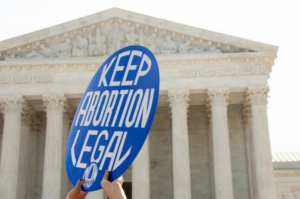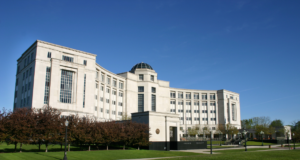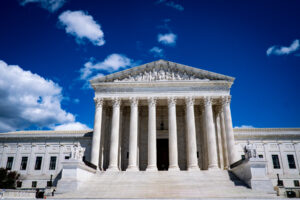Supreme Court faces litany of major cases this term
4 min read
The U.S. Supreme Court began its fall term this week and faces a series of high-profile cases that could have impacts nationwide.
The justices, who are returning to in-person meetings this term, will consider several major cases, including those touching on 2nd Amendment rights, abortion, and taxpayer funding for religious schools.
Arguably the most prominent among them is Dobbs v. Jackson Women’s Health Organization, an abortion case to be heard in December that some speculate could lead to the overturning of Roe v. Wade.
The case in question addresses a challenge to a Mississippi law banning abortions after 15 weeks and considers the constitutionality of abortion bans taking effect before a fetus would be viable outside the womb.
Mississippi Attorney General Lynn Fitch has requested that the Supreme Court take this case as a potential opportunity to overturn Roe v. Wade and Planned Parenthood v. Casey, which would make it the biggest abortion ruling in decades.
“More fundamentally, this Court in Casey never once refers to its holding as a ‘ban’ on pre-viability abortion regulations,” says a brief filed by the legal team representing Thomas Dobbs, State Health Officer of the Mississippi Department of Health. “And the Court has not treated Casey as an outright ban in any event. That is why the Court in Gonzales v. Carhart … upheld the federal Partial-Birth Abortion Ban Act, even though that Act restricts certain abortion procedures previability.”
Another key case before the high court is New York State Rifle & Pistol Assn. v. Bruen, a gun rights case addressing the right to carry firearms in public. The case challenges a New York law that strictly limits who can carry firearms outside the home.
“New York prohibits its ordinary law-abiding citizens from carrying a handgun outside the home without a license, and it denies licenses to every citizen who fails to convince the state that he or she has ‘proper cause’ to carry a firearm,” the gun rights advocates wrote in their writ requesting the high court to review the case.
The case began when Robert Nash and Brandon Koch applied for concealed carry licenses to carry guns outside their New York homes but were denied. Nash cited several robberies in his neighborhood. A New York affiliate of the National Rifle Association partnered up with both gun owners to help file the legal challenge.
“Absent such a need, applicants may receive a ‘premises’ license that allows them to keep a firearm in their home or place of business, or a ‘restricted’ license that allows them to carry in public for any other purposes for which they have shown a non-speculative need – such as hunting, target shooting, or employment,” the states’ defense wrote. “The individual petitioners here received restricted licenses.”
The two men argue that New York residents have a constitutional right to carry a weapon without having to satisfy New York’s high and arbitrary standard.
Overturning that law could significantly expand gun rights in other states around the country.
“In District of Columbia v. Heller, this Court held that the Second Amendment protects ‘the individual right to possess and carry weapons in case of confrontation,’” the challengers’ writ reads. “The question presented is: Whether the Second Amendment allows the government to prohibit ordinary law-abiding citizens from carrying handguns outside the home for self defense.”
Whether the Washington, D.C. case precedent carries over to the New York law and other similar laws will be a major decision before the court.
The high court will also hear what could be a blockbuster religious case in Carson v. Makin. The case in question features a family suing the state of Maine because the state’s tuition funding assistance program for areas without public schools cannot be used at religious schools.
The case will consider whether Maine’s decision to ban religious schools from receiving funds violates the Free Exercise Clause of the Constitution.
Opponents of Maine’s rule call it unfair discrimination of religious students and point to Espinoza v. Montana Dept. of Revenue, a Supreme Court ruling last year where the court ruled in favor of a similar program in Montana, where students could receive state funds even when it would go toward education at a religious institution.
As the high court heads into the next term, it announced late last week that Justice Brett Kavanaugh had been diagnosed with COVID-19. The court said Kavanaugh had been vaccinated and had no symptoms as of Friday.
“Justice Kavanaugh will participate in next week’s oral arguments remotely from his home after testing positive for Covid-19 this week,” the court said Friday. “All of the other Justices, including Justice Kennedy, tested negative in advance of today’s investiture. Per current Court testing protocols, all of the Justices are regularly tested.”
This article was originally posted on Supreme Court faces litany of major cases this term







